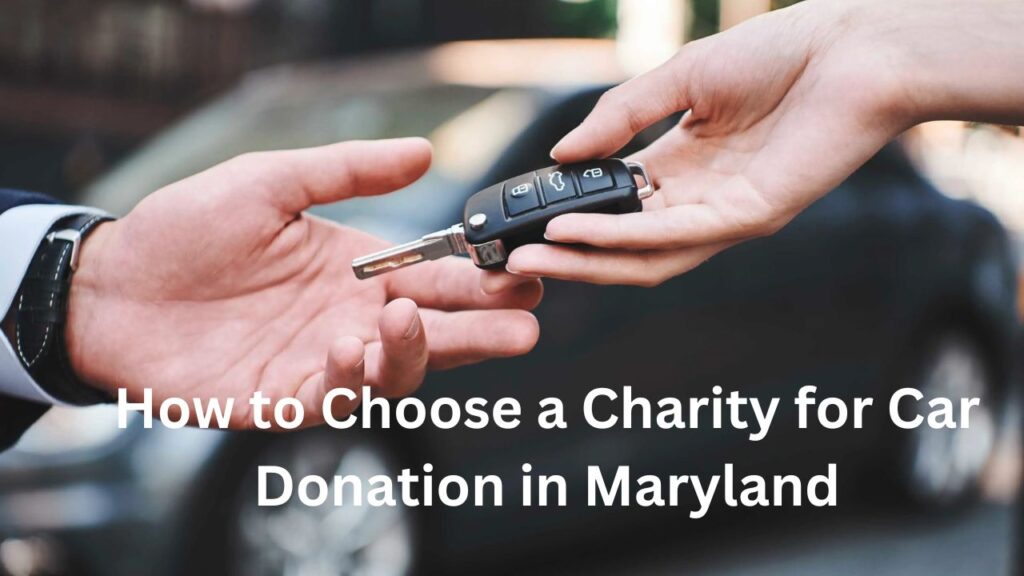How to Choose a Charity for Car Donation in Maryland
Donating your car is a generous way to support a cause you care about, and in Maryland, there are numerous charitable organizations that accept vehicle donations. However, with so many options available, choosing the right charity can be overwhelming. To ensure your car donation makes the most meaningful impact, it’s important to carefully evaluate potential charities. Here’s a guide on how to choose the right charity for your car donation in Maryland.
1. Align Your Donation with Your Values
The first step in choosing a charity for your car donation is to consider what causes are most important to you. Maryland is home to a wide variety of charitable organizations, including those focused on healthcare, children’s welfare, animal rescue, veterans, homelessness, and more. Donating to a charity that aligns with your values ensures that your contribution will have a personal meaning.
For example, if you’re passionate about supporting cancer research, you might choose organizations like the American Cancer Society. If you’re more focused on community building and affordable housing, you might consider donating to Habitat for Humanity.
2. Research the Charity’s Reputation
Not all charities are created equal. Some are more transparent in how they use donations, while others may have questionable practices. To ensure your car donation goes to a trustworthy cause, research the charity’s reputation. Look for:
- Accreditation and Ratings: Websites like Charity Navigator and GuideStar provide ratings and reviews of nonprofit organizations, including details about how funds are allocated. These ratings can help you determine if the charity is financially responsible and reputable.
- Reviews and Testimonials: Check online reviews and testimonials from other donors to gauge their experiences with the charity. This can give you a sense of how well the organization communicates and follows through with donations.
- Transparency: A reputable charity should be transparent about how they use donations. Ask how much of the funds raised through car donations directly benefit the cause. Some charities may use a third-party vendor to sell donated cars, and it’s important to know how much of the sale price actually supports the charity’s mission.
3. Check for Proper Tax-Exempt Status
Before donating your car, ensure the charity is registered as a tax-exempt 501(c)(3) nonprofit organization. This status is necessary for you to claim a tax deduction for your donation. You can verify a charity’s tax-exempt status through the IRS Exempt Organizations Database. If the charity is not a 501(c)(3), your donation may not be eligible for a tax deduction.
4. Understand How the Charity Uses Car Donations
Different charities handle car donations in different ways, so it’s important to understand how your vehicle will be used or processed. Some charities may:
- Sell the car at auction: The charity may sell your vehicle and use the proceeds to fund its programs. If you choose a charity that sells the vehicle, your tax deduction will generally be based on the amount the car sells for.
- Use the car for their own needs: Some charities, especially those with programs like transportation for the homeless or veterans, may keep the car for their own use. In this case, your tax deduction will be based on the car’s fair market value.
Make sure you are comfortable with how the charity plans to use the car and whether that aligns with your expectations.
5. Confirm the Charity’s Vehicle Donation Process
Not all charities have the same vehicle donation process, so it’s important to ask about the logistics. Key questions to ask include:
- Do they offer free towing? Most charities will arrange free towing for your vehicle, but it’s important to confirm this upfront, especially if your car isn’t running.
- What documentation do they require? Ensure that you understand the necessary paperwork. Charities will typically need the car’s title and registration, but some may also ask for additional documentation.
- How long will the donation process take? Make sure the timeline for pick-up or drop-off fits your schedule.
6. Consider Local Charities
While large national organizations often accept car donations, local Maryland-based charities may benefit more directly from your donation. Local nonprofits might have fewer resources, so your donation could have an immediate, tangible impact on your community. Whether it’s a food bank, a local animal shelter, or a veterans’ support organization, donating to a Maryland-based charity can help address needs in your own backyard.
7. Avoid Scams
Unfortunately, car donation scams exist, so it’s essential to be cautious. Avoid organizations that seem untrustworthy or that ask for personal information like your Social Security number. Be wary of charities that don’t provide clear contact details or seem unwilling to answer your questions about how your donation will be used.
Conclusion
Choosing the right charity for your car donation in Maryland involves more than just picking a name off a list. By aligning your donation with your values, doing thorough research, and understanding how the charity will use the car, you can ensure your contribution has the maximum impact. Whether you choose a large national nonprofit or a local organization, taking these steps will help make your car donation a meaningful and rewarding experience.



